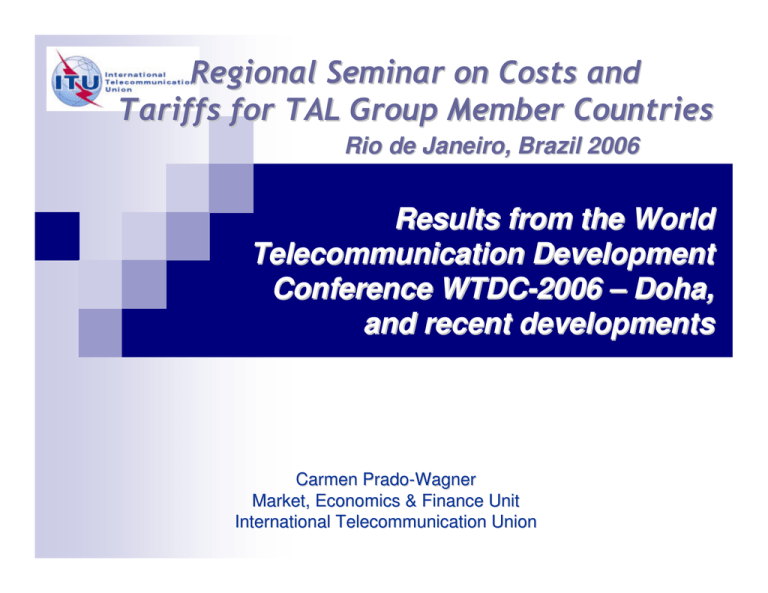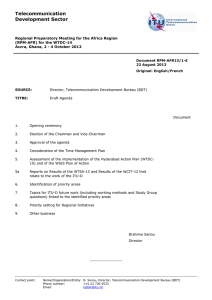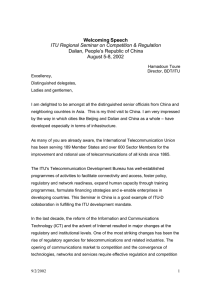Results from the World Telecommunication Development Conference WTDC -
advertisement

Rio de Janeiro, Brazil 2006 Results from the World Telecommunication Development Conference WTDC-2006 – Doha, and recent developments Carmen Prado-Wagner Market, Economics & Finance Unit International Telecommunication Union Some facts about the WTDC-06…. • Participation: 1076 participants, from regulatory authorities and Operators, 22 Ministries of telecommunications and 30 Deputy Ministries, 12 Ambassadors … • Documents: More than 280 documents were read and treated… • Two successful outside events: Connect the World Panel and Woman Breakfast. • 4 MoU’s signed (Cisco, Alcatel, Industry Canada, Child Help line International CHI)… • Three publications and one software were launched by information sessions… What happened in Doha? Approval of resolutions and recommendations Approval of ITU-D Study Group activities: Revised Questions New Questions Programmes Regional initiatives WSIS committee results Approval of resolutions and recommendations More than 38 resolutions and 5 recommendations were revised and approved during the Conference. These resolutions concern the directives and guidelines for BDT to give assistance to countries. ITU-D Study Group activities Study Group 1: Revised Questions: Question 6-2/1 Regulatory impact of next generation networks on interconnection Question 7-2/1 – Regulatory policies on universal access to broadband services Question 10-2/1 – Regulation for licensing and authorization of converging services Question 12-2/1 – Tariff policies, tariff models and methods of determining the cost of services on national telecommunication networks, including next-generation networks Question 18-1/1 - Domestic enforcement of telecommunication laws, rules, and regulations by national telecommunication regulatory authorities Question 19-1/1 – Implementation of IP telephony in developing countries ITU-D Study Group activities Study Group 1: New Questions: New Question [20/1] – Access to telecommunication services for people with disabilities New Question [21/1] – Impact of telecommunication development on the creation of employment New Question [22/1] – Securing information and communication networks: Best practices for developing of a culture of cybersecurity Study Group 2 Question 9-2/2 – Identification of study topics in the ITU-T and ITU-R study groups which are of particular interest to developing countries Question 10-2/2 – Telecommunications for rural and remote areas Question 11-2/2 – Examination of terrestrial digital sound and television broadcasting technologies and systems, including cost/benefit analyses, interoperability of digital terrestrial systems with existing analogue networks, and methods of migration from analogue terrestrial techniques to digital techniques Question 14-2/2 – Telecommunications for e-health Question 17-2/2 – Progress on activities for e-services/applications in the world Question 18-1/2 – Implementation aspects of IMT-2000 and information-sharing on systems beyond IMT-2000 for developing countries Question 19-1/2 – Strategy for migration from existing networks to next-generation (NGN) for developing countries Question 20-2/2 – Examination of access technologies for broadband telecommunications New Question [22/2] – Examination of ICTs and active and passive space-based sensing systems as they apply to disaster prediction, detection and mitigation Resolution 9 (Rev. Doha, 2006) Participation of countries, particularly developing countries, in spectrum management ITU-D Programmes Programme 1 – Regulatory reform Programme 2 – Information and communication infrastructure and technology development Programme 3 – E-strategies and ICT applications The focus of ITU-D’s work in the area of policy, regulation and strategy will be on assisting Member States and national regulatory authorities in developing and implementing an enabling environment that fosters a supportive, transparent, pro-competitive and predictable policy, legal and regulatory framework. This programme should assist Member States and ITUD Sector Members to maximize the utilization of appropriate new technologies in the development of their information and communication infrastructure, by taking due account of the accelerated convergence of the telecommunication networks and services. In ITU the term "telecommunication" includes sound and television broadcasting. To assist developing countries, through the use of information and communication technologies (ICT) and telecommunication networks, to advance the achievement of national, regional and the internationally agreed development goals, by promoting the use of ICT-based products, networks, services and applications, and to help countries overcome the digital divide. Programme 4 – Economics and financing, including cost and tariffs Programme 5 – Human capacity building Programme 6 – Least developed countries and small island developing states, and emergency telecommunications Assists in developing and implementing financing policies and strategies appropriate to economic situations, including cost-orientated pricing, with a view to fostering equitable and affordable access to innovative and sustainable services. This programme is in charge of the cost of International Internet Connectivity Assists developing countries in strengthening their human, institutional and organizational capacity through human resource management and development activities, providing a training programme through the Regional Centres of Excellences (CoE). This programme is aimed at integrating LDCs and SIDS into the world economy through information and communication technologies (ICT) and through the implementation of disaster-risk reduction measures in developing countries, and for its ability to exert a positive impact on the delivery of assistance to these countries. About activities: Activity 1: Statistics and information on telecommunications/ICT In accordance with Resolution 8 (Rev.Istanbul,2002), WTDC-02 noted that the sharing and dissemination of information/data/indicators is a key role for ITU-D. Activity 2: Partnerships and promotion This cross-cutting activity supports the programmes and study groups which are critical to sustainability of ICT development. About special initiatives: Initiative 1: Private sector initiatives Initiative 2: Gender issues Initiative 3: Youth initiatives Initiative 4: Indigenous people issues To promote increased Sector membership and active participation of Sector Members in ITUD activities. Facilitate, develop and engage in activities aimed at ensuring that the benefits of telecommunications and the emerging information society are made available to all women and men on a fair and equitable basis. To seek appropriate means of integrating youth issues into the activities of BDT, including through programmes with emphasis on capacity building, and to establish a mechanism for coordination with the Youth Forum. To support Member States in addressing special needs of indigenous people as regards equitable access to telecommunication/ICT services. Regional Initiatives The WTDC decided to select a determinate number of initiatives by region. Resolution 17 defines clearly the implementation of all the regionally approved initiatives at the national, regional, interregional and global level BDT will make the utmost use of available resources by means of equitable allotments mentioned for each region. Regional initiatives for Americas Connectivity in rural areas, marginal urban areas and isolated areas in the Americas region Interconnection of information networks for disaster prevention Support to administrations in the design and implementation of policies and programmes for largescale development of broadband access, with a view to meeting national universal service objectives Establishment of a Caribbean Task Force on spectrum management Caribbean centre of excellence project RCC Regional initiatives Strengthening the effective use of spectrum by providing interactive multimedia digital broadcasting networks in countries with mountainous terrain Creation of international centres for the implementation and testing of new technologies Implementation of e-applications based on broadband technologies Introduction of integrated, ubiquitous telemedicine technologies and systems for bridging the digital divide Future development and establishment of "centres of excellence" and creation of a learning space Asia-Pacific regional initiatives Telecommunication/ICT policy and regulatory cooperation in the Asia-Pacific region Rural communications – Infrastructure development NGN planning The unique telecommunication/ICT needs of Pacific islands and small island developing states (SIDS) in the Asia-Pacific region Strengthening the collaboration between ITU-T and ITU-D Arab regional initiatives ICT indicators - capacity building for measuring them Development of an Arab regulatory framework/guidelines for ICT Arab centre for digital documentation (Memory of the Arab world) Connection of Arab internet networks (National access points) Translation and Arabization of ICT terminology African regional initiatives Human and institutional capacity building Strengthening and harmonizing policy and regulatory frameworks for integration of African ICT markets Development of a broadband infrastructure and achievement of regional interconnectivity ICT applications Introduction of new digital broadcasting technologies Role of ITU in the implementation and follow-up of the WSIS outcomes WSIS confirmed the importance of ITU’s traditional mandate and objectives. Specifically, paragraphe 64 in the Geneva Declaration of Principles recognizes that ITU’s core competencies in the field of ICTs – assistance in bridging the digital divide, international and regional cooperation, radio spectrum management, standards development and the dissemination of information- are of critical importance for building the Information Society. In addition, the WSIS outputs recognize that ITU (along with UNESCO and UNDP) should play a leading facilitating role in the efforts to more fully address the issue of ICTs and development. (Doc. 178Rev2) Inclusion of the WSIS outcomes in the BDT Plan of Action A comparison of paragraphs of the Geneva Plan of Action with the programmes, activities and initiatives of the Istanbul and Doha Action Plans shows a high degree of correspondence between the intentions expressed by the WSIS accord signatories and the ITU-D membership as expressed in the Istanbul and Doha Action Plans. This is an indication of how important the groundwork done by ITU, and particularly ITU-D, may be in achieving the goals of WSIS. WTDC-06 adopted the thematic instruments (BDT programmes, activities and initiatives at the global level), and regional initiatives submitted by Member States. Thus, ITU is sure to address the core domains identified by WSIS: the thematic approach and the need to act through large-scale initiatives, either at the national or at the regional level. Publications presented during the WTDC-06 World Telecommunication Development Report 2006 Trends in Telecommunication Reform 2006: Regulating in the broadband world and the toolkits for regulation… Trends in Economics and Finance 2006: the use of economic modelling in telecommunications SMS4DC- Spectrum Management System for Developing Countries Thank you

